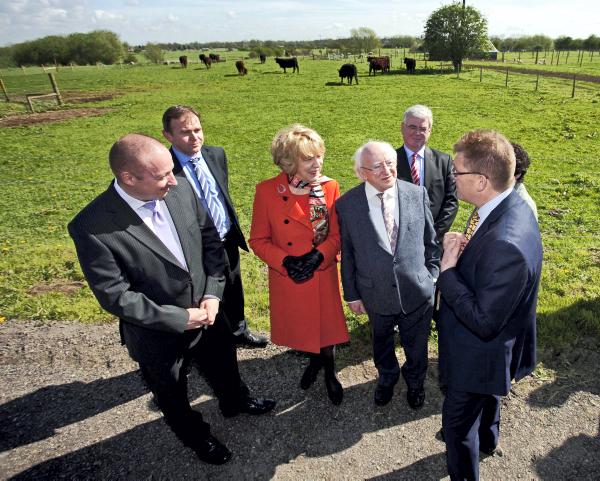The green fields, fresh air and general stillness (despite the tweeting birds, cackling geese and cock-a-doodle-doos) were in stark contrast to the hustle and bustle of the city events over the last few days. London city and the Oxford countryside may be worlds apart but the Thames runs through both.
This was one of the longest visits on the President’s trip, lasting 90 minutes instead of the usual 30. It was more relaxed that the others – this was the first event of this trip where there were straw bales in the press centre.
Despite the serenity, there was no doubting the importance of this visit. The UK is the largest export market for Irish food and drink.
Imports account for one third of consumption in the UK and 42% of our exports, to the value of €4.2billion, were sent across the Irish Sea in 2013. This represented an 8% increase on 2012 alone.
37% of our dairy exports alone went to the UK last year and in the four years since 2009, export figures to the UK have grown by 31%.
This is a market with ever increasing potential. The UK population is set to grow by 10 million over the next 25 years and for the beef sector in particular, Britain is only self-sufficient for approximately 70% of its beef consumption.
Despite all this, it is important to recognise we are almost just as important to the UK with €3.8billion worth of their exports arriving on our shores in 2013. Ireland is the number one destination for UK food and non-alcoholic drink.
The FAI Farm at Oxford was chosen for the visit because of its innovative sustainability research, or in the words of Bord Bia Chief Executive Aidan Cotter – “it is a location we have been involved in meeting after meeting, collaborating with industry stakeholders including the sustainable agriculture initiative which is about sharing best practice around sustainability with our peers in other countries, with organisations like McDonald’s for example.”
Bord Bia used the visit to promote their own sustainability programme, Origin Green, which is the world’s first sustainability programme to carbon footprint farms on a national scale. Approximately 55,000 farms in Ireland have already been assessed and Bord Bia says that by 2016 all Irish food and drink exports from farms and food businesses will have verified sustainability commitments.
But back to Presidential matters.
One of the stops on Michael D.’s visit was the poultry area of the farm – which is focused on egg-laying rather than chicken meat.
Poultry project
Dr Ashley Graham, Head of Science at FAI, explained about the farm’s poultry project which has been running for over six years with McDonald’s (interestingly, all eggs used in McDonald’s restaurants in the UK are free-range). The FAI farm has over 1,000 chickens laying eggs but their biggest welfare problem was cannibalism. Although cannibalism in its extremest form is quite rare, the bird peck each other’s feathers quite a lot.
In the first year of the original study, FAI experimented with a solution - by planting 5% of the area the poultry were kept in (on 280 farms) with tree cover, providing the birds with a canopy.
It worked.
In those flocks there’s a lower problem with pecking” said Dr Ashley Graham. “Flocks with tress on the range have lower mortality.”
“All chicken think they’re jungle fowl!” explained the farm manager to the President. “This is why chickens are showing a preference for dappled shade. They are afraid of predators – they are domesticated but they still have their natural instincts.”
Sabina pointed out that the canopy was composed of birch trees and therefore have small leaves, “so shouldn’t the light come through?"
It does, and this is good for the poultry.
The Higgins really did seem to be enjoying their visit.
Aidan Cotter wasn’t surprised. He told the Farmers Journal; "Other than the genuine interest that they have, I think the President has always been interested in things of the earth, we know that from our involvement with him in Bloom. He’s the patron of Bloom and last year in the Phoenix Park he spent three hours with us, way beyond the norm. I think there’s a huge commitment and a huge personal interest in that area, so I wasn’t surprised at all that he has this commitment around sustainability. I think it is much aligned with his thinking.”
Other stops on the farm tour included the sheep sheds where the President learned about the farm’s five-point plan to cure lameness in a flock, while the last stop was at a field full of very impressive Saler (“sometimes people call them ‘sailors,” explained the farm manger) and Aberdeen Angus cattle
On a beautiful day like today, you’d never think 400 acres of this farm were under floods in February; much of the farm sits on flood plains. But as the sun baked our backs, Aidan Cotter described the visit as “superb”.
“The President endorsed and supported the Origin Green programme, the journey of sustainability that Irish farms and the Irish food industry have embarked on and I think in our single largest market, accounting for over 40% of our food and drinks exports, that endorsement is worth an awful lot.”






 This is a subscriber-only article
This is a subscriber-only article











SHARING OPTIONS: